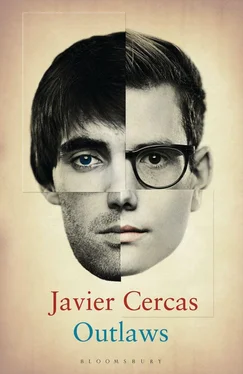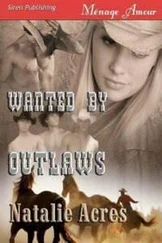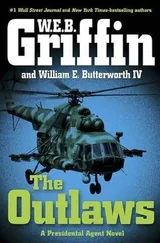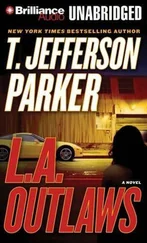‘All this explains why I started to go to see Zarco at the prison almost immediately, more to chat for a while than for work, and that our conversations became much more intimate than they had ever been before. Obviously it never occurred to me to tell him what Tere had revealed in my office; actually, as far as I recall, we barely talked about Tere except in passing. We talked a lot, however, about his mother (who was living in Gerona, like some of his family, and with whom he hadn’t been on speaking terms for years), and especially about his three older brothers, three quinquis who he’d got to know when he was eleven or twelve, with whom he’d lived for a very short time and who’d been the idols of his youth; all three had died more than a decade before in violent circumstances: Joaquín, the youngest, crashed into a moving van at an intersection in El Clot, in Barcelona, while fleeing the police in a stolen car; Juan José, the eldest, while trying to slip down a rope from the window of the Madrid prison hospital, where he had been moved from a prison where he was serving thirty years for homicide; Andrés, the middle brother and for many Zarco’s model, at a police roadblock on the way into Gerona, after robbing a bank in Llagostera, when the police shot him when they saw him reaching for his pistol. But you know all these things: they’re in the cuttings in my archive and besides, if I’m not mistaken, Zarco recounts them in his memoirs.’
‘You’re not mistaken.’
‘Of course: actually, most of the things he told me then he’d already told in his memoirs, sometimes even in the same way and almost in the same words, so I sometimes had the impression that Zarco wasn’t telling me what he remembered but what he remembered having told in his memoirs. Anyway, I enjoyed listening to him a lot, hearing him talk about the riots and escapes he’d played a starring role in, the books he’d signed or that had been written about him and the movies he’d been in, the journalists and film directors and actresses and musicians and football players he’d met. In this way I discovered something that surprised me, and it’s that, in his memoirs and interviews, Zarco had lied or adorned the truth much less than I’d thought (and less in the second volume of the memoirs than in the first, according to him, through the fault of Jorge Ugal, the ghostwriter who later, in part thanks to that book, went on to have a short political career); or to put it another way: what I discovered was that it hadn’t been Zarco who’d constructed his own myth, but most of all the newspapers and the films Bermúdez made, and all he did was to approve it, make it his own and spread it.’
‘So you think his memoirs are reliable.’
‘I think so. Except on particular points, of course.’
‘For example?’
‘For example on the death of Bermúdez. From the first moment everybody thought Zarco was the one who killed him, who shot him up with that overdose of heroin and set up that scene to look like a ritual sacrifice or a sexual crime. .’
‘But in the memoirs he denies it.’
‘What else was he going to do? I’m sure it’s true.’
‘Did he confess?’
‘No: he denied it. But at that time I could tell when he was lying and when he was telling the truth, and on that matter he lied to me. I’m sure. Or almost sure. You should have heard him bitch about Bermúdez; he really badmouthed him, but not because Bermúdez was homosexual, as some have said: he didn’t care about that, in fact I think he always knew Bermúdez was in love with him and he played with that, or tried to. No, I think he hated Bermúdez for other reasons: he thought that, with Zarco’s saga and his other films about young quinquis starring real quinquis that followed, Bermúdez had made a fortune and won prestige in the film world at his expense, and on top of that he’d done so by presenting himself as a sort of philanthropist who wanted only to save him and other kids like him; he claimed that Bermúdez’s Catholic altruism was hypocritical, a stomach-turning way to sell his films; he said he’d swindled him from the start, that he’d stolen his life to make into films, that he’d promised he’d get to star in them and that it’s not true that he didn’t star in them because the supervising judge wouldn’t let him leave the prison (as was generally thought), but because in the end Bermúdez wanted someone else to star; he also said that he paid him much less money than they’d agreed he would pay, that it was a lie that he’d legally adopted him while they were filming his last movie and even more of a lie that he’d disinherited him as a punishment for having taken advantage of the press-screening cocktail party, at the Ocaña penitentiary, to escape. . Anyway, I think by the end his relationship with Bermúdez had gone sour, and as Bermúdez said, that Zarco staged that escape in part to fuck him over and to fuck up his film and that later, when the police were looking for him, he appealed to Bermúdez again and things got out of hand or he bumped him off on purpose, or had him bumped off. Zarco was like that: if he came to the conclusion that someone was a real bastard, or had acted like one, he would make that person pay if at all possible.’
‘As might have happened with Batista.’
‘For example.’
‘It’s strange then that he didn’t make María Vela pay for what she did.’
‘No, not strange: the thing is he didn’t consider María to be a real bastard. And he was probably right. María was just a mediapath, like him, or rather, like the Zarco character; at most she was an opportunist. But not a bastard. And maybe that’s why Zarco, in the conversations we had then, never spoke badly of her, always downplayed the importance of what she said about him in the press (or what she was still saying, which was less and less as there were fewer and fewer people paying any attention) and he didn’t seem at all irritated by all the visibility in the media she’d achieved at a certain moment by messing with us; more than that: my impression was that Zarco spoke more cordially of María now than he had done when they were together and she spent all her time trying to get him out of jail.
‘But what Zarco and I discussed most — where I believe the complicity I told you about sprang from — was none of that, but the summer of ’78. In fact, we could spend all of my afternoon visits in the interview room remembering the guys in the gang, reliving purse snatches, robberies and binges, recalling the General haggling with his wife — who Zarco insisted was actually blind not pretending to be blind — telling each other details of a visit to La Vedette or trying to rescue from oblivion the names and faces of the regulars at La Font or Rufus. Those conversations at times turned into fierce tournaments in which Zarco and I competed in eagerness for precision about the past; thanks to them — and to those I’d had with Tere years earlier, in our nights of romance in my penthouse on La Barca — I was able to reconstruct the summer of ’78, and that’s why I remember it so well. Of course, Zarco often talked about the prefabs, and one day I told him about the only time I’d been there, shortly after the robbery of the Bordils branch of the Banco Popular, although I didn’t tell him that I’d actually gone there that day to see Tere and especially to find out if the gang thought I’d been the one who had given the game away (and, if so, to refute it). This doesn’t mean that we didn’t talk about that matter then, actually we discussed it several times, but always in the way we discussed all the details of the summer of ’78, a slightly strange way, very cerebral, almost with the coldness with which you might discuss a chess problem; whatever the case, I always arrived at the conclusion that Zarco thought that the snitch or informer could have been anybody that day, but that anybody didn’t exclude me.’
Читать дальше












